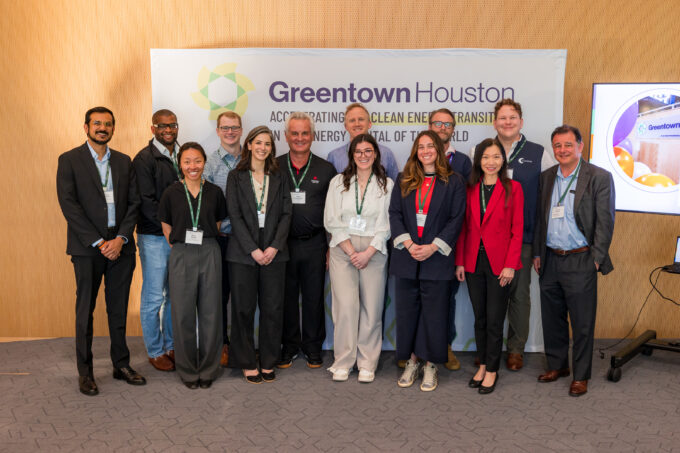Over the past six months, the Greentown Go Make 2023 startup cohort has worked closely with Shell to accelerate partnerships to deploy and commercialize technologies for carbon utilization, storage, and traceability.
The six participating startups—Caravel Bio, Circularise, Corumat, Lydian, Maple Materials, and Universal Matter—were chosen in a highly competitive selection process that saw more than 100 applications. Throughout the accelerator, they worked with Shell to de-risk their technologies, discover potential industrial applications, and develop viable go-to-market strategies. A group of experienced startup mentors and industry experts, including a team of varied subject matter experts from Shell, provided valuable guidance to the cohort’s founding teams.
As part of its technology portfolio, Shell invests in net-zero-carbon and carbon-removal technologies to mitigate and reduce greenhouse-gas emissions. Go Make 2023 supported Shell’s strategy by facilitating the development and scaling of technologies for carbon capture, utilization, and traceability in areas core to Shell’s decarbonization strategy.
Read about the startups, their progress during the accelerator, and how they worked with Shell below, and check out a recording of the Go Make 2023 Final Showcase here!
Caravel Bio
Technology at a glance: Caravel Bio (Portland, OR) is developing a novel synthetic-biology platform that uses microbial spores and enzymes to create catalysts that are long-lasting and can withstand extreme conditions and environments.
Progress during the program: Caravel Bio worked closely with Shell’s carbon capture and innovation teams to explore how its technology can lower carbon-capture costs for Shell and its customers. The startup plans to conduct a validation study for carbonic anhydrase using its Spore-Display technology and will continue meeting with its mentors from Shell and explore collaboration pathways as the study progresses.
“The Go Make 2023 program was incredibly transformational for our company,” says Caravel Bio’s CEO Emily Weinberg. “We were able to build connections and trust with key stakeholders throughout Shell and get a deep understanding on what will move the needle for our and their businesses.”
Circularise
Technology at a glance: Circularise (Den Haag, Netherlands) develops a blockchain platform that provides digital product passports for end-to-end traceability and secure data exchange for industrial supply chains.
Progress during the program: Circularise and Shell explored how the startup’s traceability tech can help Shell manage its life-cycle analysis and carbon footprint data, as well as verify the sustainability of its products. Circularise presented a series of workshops to the Shell team and has identified three potential follow-on projects.
Corumat
Technology at a glance: Corumat (Yakima, WA) converts organic waste into high-performance, insulating, greaseproof, and biodegradable packaging materials.
Progress during the program: Corumat and the Shell TechWorks team identified synergies in their strategies for systems engineering and rapid iteration in customer concepts. Corumat and Shell are continuing to validate the startup’s technology and business model and are exploring future collaborations.
“Greentown and Shell were fantastic partners in this accelerator,” says Corumat’s CEO Mike Waggoner. “We entered the program with a high-level understanding of Shell’s goals for decarbonization, and hoped there would be an opportunity to work with them. We were introduced to the right groups to find near-term commercial opportunities and investment.”
Lydian
Technology at a glance: Lydian (Cambridge, MA) develops a fully electrified, highly efficient reactor that converts carbon dioxide and other non-fossil-fuel feedstocks into sustainable fuels and chemicals. Its first product is a drop-in replacement for commercial aviation fuel.
Progress during the program: Shell advised Lydian on structured frameworks for technology assessment, which the startup has now put into practice. Lydian is in the process of constructing its first pilot-scale system and plans to continue communicating with the Shell team as it progresses.
“We were excited about working with Shell through the Go Make program because of the incredible infrastructure that they already have in place and all of the expertise they have, both upstream and downstream of our process,” says Lydian’s Head of Business Operations Paige Omura.
Maple Materials
Technology at a glance: Maple Materials (Richmond, CA) develops a low-cost electrolysis process to convert point-source carbon dioxide into graphite and oxygen.
Progress during the program: Shell performed an internal validation of Maple Materials’ graphite performance metrics, which will serve as additional validation for the startup. Shell also helped Maple Materials evaluate CO2 feedstocks and applications for sodium-ion-battery anodes.
“With Shell, we accomplished another third-party confirmation of our unique product,” says Maple Materials’ CEO Drew Reid. “We’re accelerating our commercial roadmap and have further clarity into other markets that could benefit from our graphite.”
Universal Matter
Technology at a glance: Universal Matter (Burlington, Ontario, Canada) develops a proprietary flash Joule heating process that converts carbon waste into high-value and high-performance graphene materials to efficiently create sustainable, circular economies.
Progress during the program: Universal Matter and Shell identified eight potential collaboration areas across upstream carbon feedstocks, downstream end-use applications for the startup’s graphene, and more. The two companies are continuing discussions around these opportunities.
“Go Make 2023 was run with exceptional efficiency to ensure that all startup members were able to gain maximum benefit from exchanges with the corporate partner,” says Universal Matter’s VP of Strategic Planning Peter van Ballegooie. “The one-on-one exchanges were extremely useful to startups, as they facilitated the connections to the relevant business units within Shell that could potentially benefit from the novel technologies being developed. Establishing the connectivity to the right discussion partners within those various business units was absolutely key to the successful outcome of the program.”


